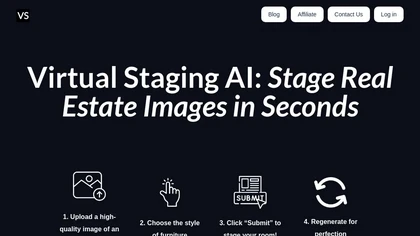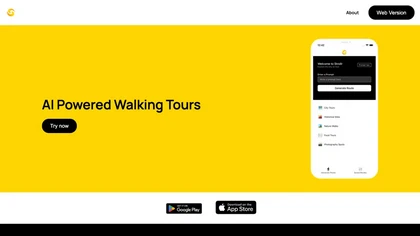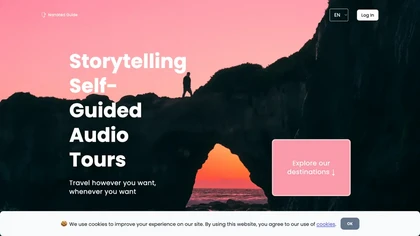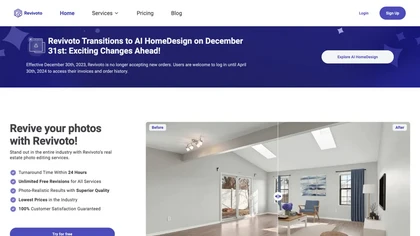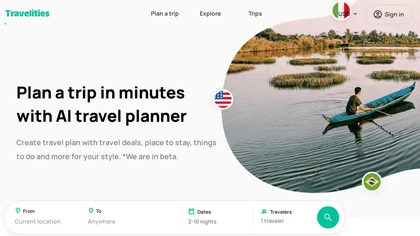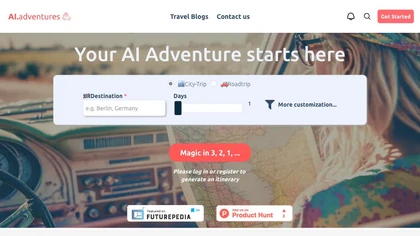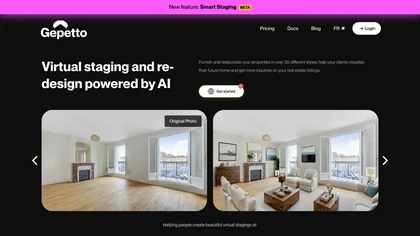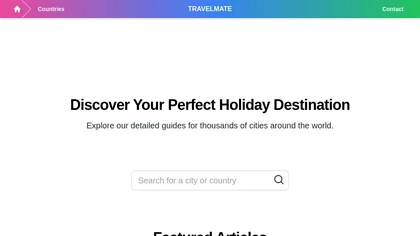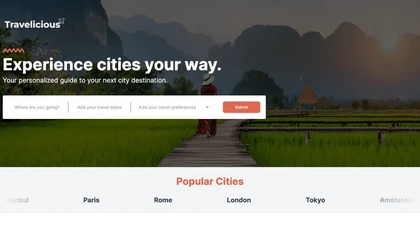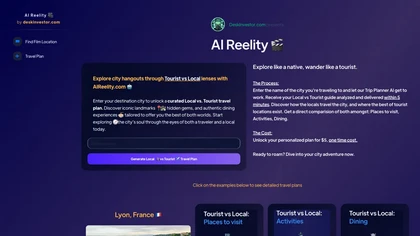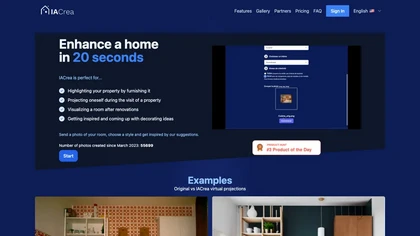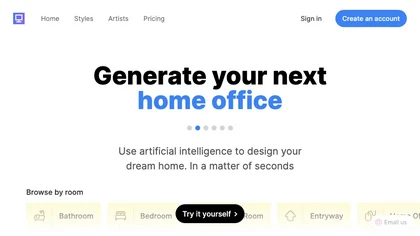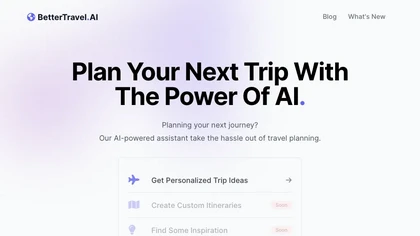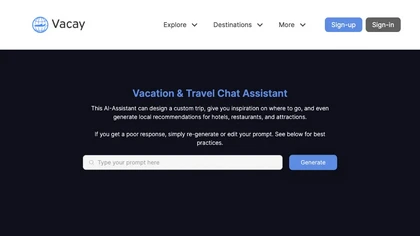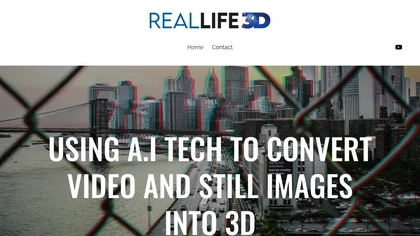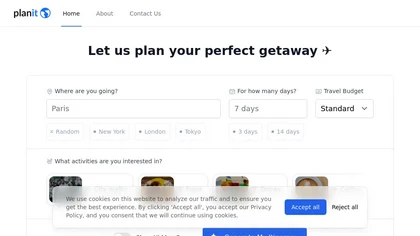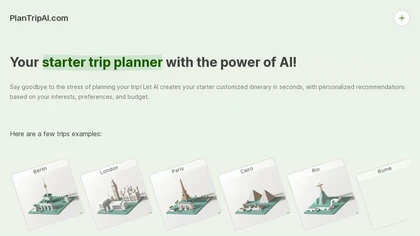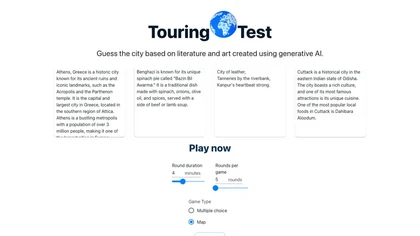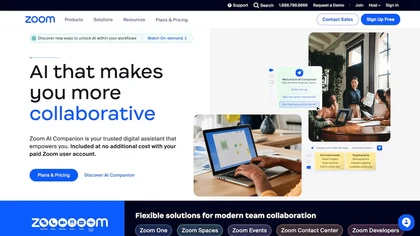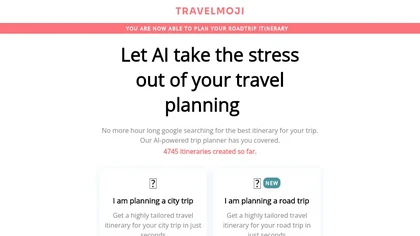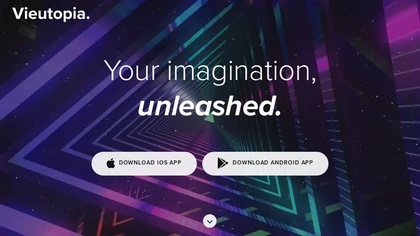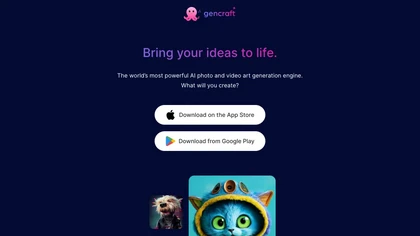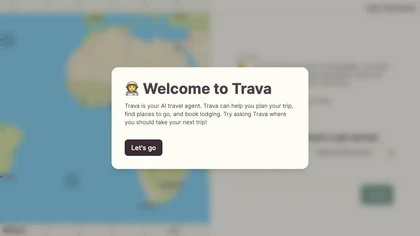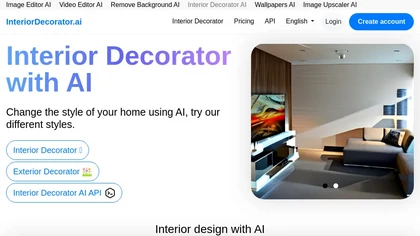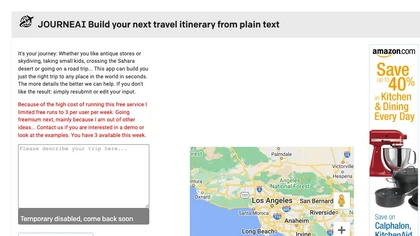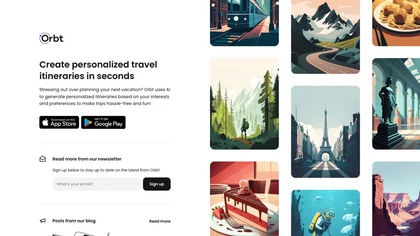AI use cases for Virtual tours
Generative AI can be applied in various applications for virtual tours. Here are some examples to explore below for inspiration with AI tools to get you started with using AI in virtual tours.
🛠️ 70 AI tools for Virtual tours
Explore a dynamic list of some of the most popular tools to get you started with various AI use cases and applications for Virtual tours to streamline your workflows and productivity today.
TravelAroundTheWorld features
- Create photorealistic ai character
- Take photos at famous spots around the world
- Variety of photo shoot styles
- Advanced ai technology and deep learning algorithms
- User-friendly interface
Summer AI features
- Ai gps technology
- Personalized experience
- Walking and driving navigation
- Augmented reality discoveries
- Visually enhanced journey
Virtual Staging AI features
- Virtual
- Staging
- Tool
- Powered
- Artificial
- Intelligence
- Fast
- Turnaround
- Eliminates
- Need
- Detailed
- Instructions
- Designers
- Allows
- Users
- See
- Instant
- Results
- Unlimited
- Revisions
- Saves
- Time
- Effort
- Increases
- Buyer
- Interest
- 83%
- Sells
- Homes
- 73%
- Faster
- Than
- Non-staged
- Counterparts
- Receives
- Higher
- Offers
- Averaging
- 25%
- More
- Than
- Unstaged
- Properties
- Supports
- Staging
- For
- Various
- Room
- Types
- Including
- Living
- Rooms
- Bedrooms
- Kitchens
- Dining
- Rooms
- Home
- Offices
- And
- Closets
- The
- Staged
- Photos
- Can
- Be
- Downloaded
- Used
- Anywhere
- For
- As
- Long
- As
- Needed
VirtualStaging.art features
- Add furniture
- Stages rooms
- 30 seconds
- Regenerate images
Strollr features
- AI-powered walking tours
- Fully custom tours
- Explore new places
- Save travel time
- Discover historic landmarks
Narrated Guide features
- Self-guided audio tours
- Immersive storytelling experience
- Support for various types of tours (walking, cycling, driving, boat)
- Personalized tour guide
- On-demand access to destination history and culture
My Travel Brain
1.6My Travel Brain features
- Plan travel
- Knowledge of travel destinations
- Answer questions about travel destinations
🔥
Create your account, save tools & get personal recommendations
Receive a weekly digest of our handpicked top tools.
Unsubscribe anytime
Virtual Staging features
- Real estate photo editing services
- Quick turnaround time
- Unlimited revisions
- Virtual staging
- 360° immersive walkthrough tours
Rooms features
- Create rooms
- Remix rooms
- Add items
- Customize rooms
- View source code
- Share room links
- Playback on desktop and ios devices
Travelities features
- Trip planning
- Personalized recommendations
- Travel deals
- Place recommendations
- Things to do
Guidie AI features
- personalized recommendations
- plan and optimize itinerary
- real-time updates
- mobile app
- location discovery
Styldod features
- Virtual staging
- Renovation
- Photo editing
- Architecture planning
- Virtual tours
The Trip Boutique features
- Create itineraries
- Recommend destinations
- Leverage expert knowledge
- Curate database of places, activities and services
- Offer various integration options
Travopo features
- Travel planning
- Inspiration
- Flight search
- Hotel search
AI adventures
1.8AI adventures features
- Generate personalized travel plans
- Offer options for city trips, road trips, and custom itineraries
- Use openai's gpt4 model
- Interactive travel blogs
ArchitectGPT features
- Image uploading for design
- Wide range of design themes
- Tailored room customization
- Curated color palettes
- Virtual staging capabilities
Dreamhouse AI features
- Home redesign
- Virtual staging
- Interior design
- Mockup creation
- Ai-powered
MonteTravelo features
- Discover unique travel destinations
- Provide unusual accommodations
- Offer access to unique spas
- Guide thrill-seekers to adrenaline attractions
- Filter choices by continent
DreamStaging.AI features
- Virtual staging
- Interior design
- Furnishing
- Marketing
- Design projects
Itraveledthere features
- Image generation
- Destinations selection
- Source image upload
- Ai-powered enhancement
- Plan selection
Gepetto features
- Virtual staging of interior design
- 30 different interior design styles
- Quickly revamp unfurnished spaces
- Experiment with various design styles
- High-quality renders and smart staging feature
Travelnaut features
- Destination planning
- Trip itineraries
- Sightseeing guides
- Nightlife guides
- Insider tips
ArchitectAI features
- Unlimited renders in 4K resolution
- Comprehensive library of 450+ architecture design styles
- Faster rendering through AI algorithms
- Automated styling for efficiency
- AI landscape design tool and 360 VR panorama interior designer
Travel Mate features
- Select a country
- Discover perfect holiday destinations
- View ai-generated guides
- Thousands of cities worldwide
RoomGPT
3.6RoomGPT features
- Virtual room remodeling
- Generating different themes for a room based on a picture
- Eliminating the need for interior design
- Positive feedback from tech experts and startup founders
- Helping users get indecisive about their home decor decisions
Roam Around features
- Travel planning
- Customized travel plans
- Pet-friendly itineraries
- Budget-friendly trips
- Honeymoon itineraries
- Family-friendly itineraries
SmallVill features
- Virtual environment exploration
- Interaction with AI agents
- Browsing and shopping exclusive NFT collections
- Autonomous planning agents
- Showcasing AI behavior patterns
Local Buddy features
- AI-powered travel planner
- Provides personalized recommendations
- Offers unique places to eat, landmarks to explore, and immersive activities
- Integrates with Google Maps for step-by-step directions
- Available on Android and iOS
Travelicious features
- Personalization of city destination experience
- Integration of AI for itinerary creation
- Recommendations based on user preferences
- Input destination, dates, budget, and interests for tailored journey
- City guide with recommendations on places to visit, eat, and explore
Splashmusic features
- Adventure creation
- Music performance
- Art exploration
- Virtual reality experience
- Community building
Room Reinvented features
- Virtual staging
- Object removal tools
- Exploration of different interior styles
- Experimentation with color palettes
- AI-generated style rooms
HereAfter AI features
- Virtual interviews
- Interactive storytelling
- Memory preservation
- Record and upload photos
- Organize memories
Artshop features
- Browse artworks
- Purchase artworks
- Access artist profiles
- Reviews
- Custom framing
- Art installation
Dreamlife features
- Design idea generation
- Home shopping
- Renovation task streamlining
- Professional networking
FreePlanTour features
- Travel itinerary generation
- Personalized travel guides
- Multi-language support
- User-friendly interface
- Subscription plans
AIreelity features
- Destination city input
- Curated travel plan generation
- Comparison of local and tourist attractions
- Personalized travel plan creation
- Quick access within 5 minutes
IACrea features
- Virtual staging
- Redecorate
- 360 virtual tour of a virtually renovated room
- Declutter a Room (Beta)
- Projection from a 3D plan
REimagine Home features
- Generate personalized design concepts
- Virtual staging
- Redesign spaces
- Inspire designs
Qonqur
4.5Qonqur features
- Webcam hand gesture control
- Brainstorming sessions
- Innovative learning tool for students
- Organizes research articles
- Unlocks knowledge
Interior Computer features
- Room styles browsing
- Design exploration
- Visualization
- Account creation
- Future reference
- Outdoor space design
Aesthetic Room AI features
- Virtual interior designer functionality
- Photo upload for room redesign
- Wide range of styles and combinations
- Creation of unique and personalized spaces
- Utilized by real estate agents for interior visualization
Bettertravel features
- Generate personalized travel recommendations
- Customize itineraries based on user preferences and interests
- Assist with travel planning without extensive research
- Easily input budget and travel plans
- Provide tailored recommendations for a more enjoyable trip
AI HomeDesign
4.9AI HomeDesign features
- Virtual staging
- Image enhancement
- Item removal
- Drag and drop feature
- Seamless integration with application or website
Virtual Friends features
- 3D embodied AI assistant
- Design and interact with personalized AI characters
- Shape virtual friends' personalities and interactions
- Dynamic and immersive interactions
- Platform for exploring AI companionship
Vacation & Travel Chat (GPT) features
- Provide custom trip plans
- Suggest destinations
- Recommend hotels
- Recommend restaurants
- Assist with trip planning
Reallife3d features
- Image-to-3d
- Video-to-3d
- Reciprocating-process
- Powerful-ai
- Content-delivery
Roamr features
- Generating day-by-day itineraries
- Personalized ai planner
- Travel options and destinations
- Eliminates time-consuming research
- Sharing travel experiences
Planit Earth features
- Generate personalized itineraries
- Cater to traveler's interests and budget
- Provide detailed itineraries
- Easily accessible through a link or pdf
Virtual Sapiens features
- AI communication coach
- Presence portal for skill assessment and improvement
- Simulated conversations for feedback
- In-call coaching
- Personalized feedback on nonverbal, vocal, and verbal cues
GetFloorPlan
4.9GetFloorPlan features
- Floor plan generation
- 2d, 3d & 360 virtual tour creation
- High picture quality
Good Tripper Guide features
- Find historical places near user
- Learn about history of specific location
- Comprehensive guide to historical sites and landmarks
- Discover hidden gem historical sites in backyard or new city
- Plan trips to historical places
Snapstager features
- Transform empty spaces into staged rooms
- Intuitive masking tool
- Consider lighting and original room structure for realistic results
- Virtual staging completed in under 20 seconds
- Get high-resolution 4K images at $1 per photo
Nomadspot features
- Trip organization
- Create travel itinerary
- Personal map sharing
- Community sharing
- Ai-powered planner
PlanTripAI features
- Trip planning
- Customized itinerary
- Personalized travel
- Generate based on interests
- Budget
RoomDeco AI features
- Virtual staging
- Room generation
- Selection of interior styles, themes, colors, and materials
- Over 100 interior styles to choose from
- Creation of photorealistic renders from rough sketches and SketchUp models
VirtualSnap features
- Automated product photography
- Instant professional-looking photos generation
- Upload product images for photo creation
- Creation of unique designs for non-existing products
- Cost and time-saving alternative to hiring a photographer
Touring Test features
- Generative AI technology for creating descriptive passages
- Guessing cities based on AI-generated content
- Exploring cities and their unique features through AI descriptions
- Game setting with rounds of multiple-choice questions
- Cultural and historical immersion through AI-generated literature
Zoom IQ features
- Video conferencing
- Screen sharing
- Team chat
- Virtual workspaces
Artadum features
- Mockup creation for artwork and photography
- Realistic decors and room settings
- Generation of multiple images with one click
- Large collection of rooms and home styles
- Option for credit purchase or subscription for unlimited credits
AMBLR - AI Travel Planner features
- Travel planning
- Curated approach
- Personalized guidance
- Activities recommendation
- Trip editing
Travelmoji features
- Generate personalized itineraries
- Recommend sights, activities, and accommodations
- Easy travel planning
Vieutopia features
- Art creation
- Diverse art styles
- Impressionism
- Fantasy
- Abstract
Wonderplan features
- Personalized itinerary generation
- Customizable itinerary planning
- Real-time collaboration
- Trip feedback improvement
- Connecting with like-minded travelers
artvisual.ai features
- Photo upload
- Ai painting generation
- Art templates customization
- Popular seller artworks browsing
- Simulated texture strokes algorithm
Gencraft features
- Video generation
- Text prompts
- Visual categories
- Brand showcasing
- Creativity elevation
Trava features
- Trip planning
- Hotel search
- Restaurant booking
- Travel destination recommendations
- Itinerary saving
Interior Decorator AI features
- Image editing
- Generate interior design ideas
- Generate exterior design ideas
- Integrate with own projects
Journeai features
- Build travel itineraries
- Recommend activities
- Assist with trip planning
- Help with destination selection
- Customize travel experiences
Orbt features
- Personalized travel itineraries
- AI technology integration
- Customized itinerary generation
- Newsletter subscription for travel trends
- Feature on ProductHunt



